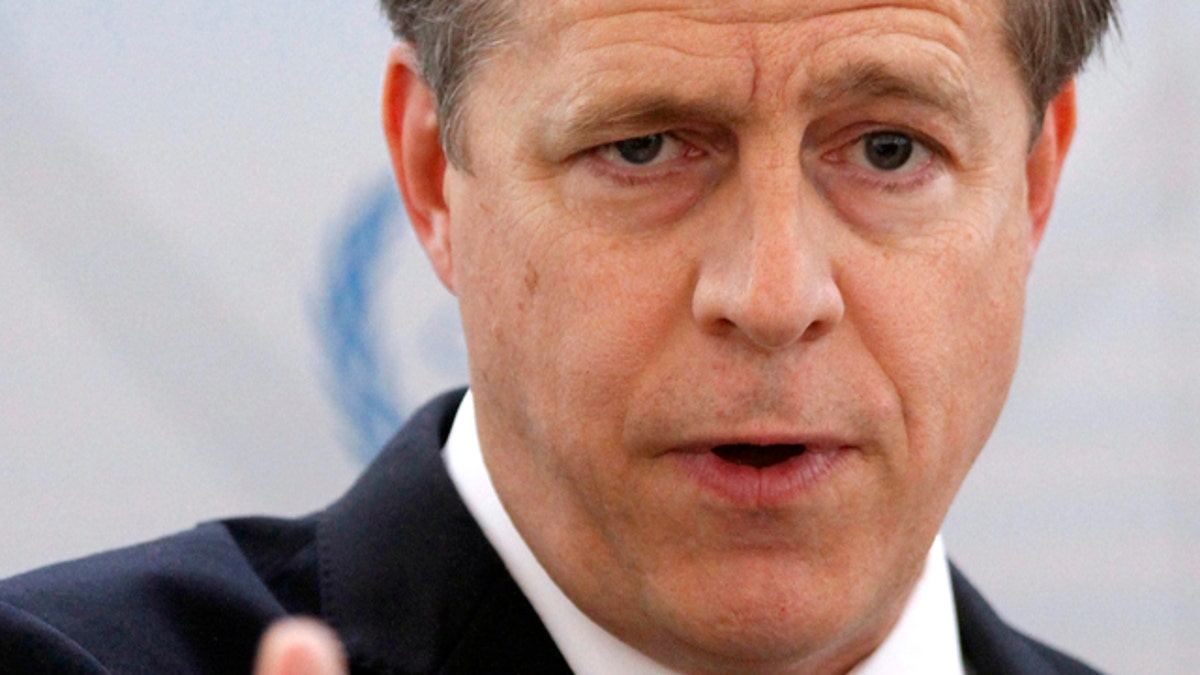
June 9, 2011: FILE - U.S. Ambassador to the International Atomic Energy Agency, IAEA, Glyn Davies speaks in Vienna, Austria. (AP)
WASHINGTON – The new U.S. envoy on North Korea is no stranger to nuclear diplomacy and finding ways to deal with prickly adversaries such as Iran. His new assignment, however, could be his toughest yet: persuading a defiant regime that boasts about its nuclear weapons to give up its arsenal in return for aid.
Glyn Davies, the U.S. ambassador to the International Atomic Energy Agency, takes up his new job as the Obama administration deepens its engagement with Pyongyang -- seeking to manage the risk of another military or nuclear provocation by the North. On Wednesday, the U.S. announced new talks with the North.
Davies is a career diplomat who served as a State Department deputy spokesman during the presidency of Bill Clinton. Before his current posting in Vienna, he held a senior position in the department's bureau for East Asia and the Pacific.
He will join the U.S. delegation at talks with North Korea on Monday and Tuesday in Geneva, the second direct U.S.-North Korean negotiations in less than three months. The delegation will be led by the current envoy, Stephen Bosworth, who has held the job since February 2009 but in a part-time capacity. Bosworth will then resign.
Also, the U.S. this week began negotiations with the North on resuming the search for the remains of service members missing from the 1950-53 Korean War. Coming after nearly two years of minimal contact, it is a flurry of diplomacy, but the administration stresses that despite the personnel change, its policy has not changed.
It wants to keep open channels of contact with the North but will not resume multinational disarmament-for-aid negotiations unless Pyongyang takes concrete action to show it is serious about meeting its previous commitments on denuclearization.
Associates say Davies, as ambassador to the IAEA, has been effective in winning support for U.S.-backed measures to pressure Iran over its nuclear program, although Tehran, which insists its program is for peaceful uses, shows little sign of heeding international opinion.
"He's a good appointment for the North Korea job, as it's a heck of a challenge," said Olli Heinonen, former IAEA deputy director-general, who described Davies' key strength as his ability in multilateral diplomacy to bring parties together.
"He's a good communicator and willing to talk to adversaries," said Heinonen. "He's easygoing and fairly low-key but can be tough when he needs to be."
Others describe Davies as likable, with a good sense of humor, a consummate networker, extremely committed to U.S. diplomacy but also known to show his frustration if his efforts are not working.
Davies previously served as a deputy to Christopher Hill, who was the top U.S. negotiator with North Korea during the presidency of George W. Bush, but Davies himself lacks the deep Korea experience that Bosworth, a former ambassador to Seoul, brought to the job.
Davies will be partnered with Clifford Hart, a China expert who will serve as U.S. special envoy to the six-nation disarmament-for-aid talks that North Korea pulled out of in April 2009 after being censured for launching a long-range missile.
"Both are quick studies, and it won't take them long to figure out that the North is not serious about denuclearization," said Victor Cha, an expert on North Korea, who was National Security Council director for Asia during the George W. Bush administration.
Since pulling out of the six-party talks, which also include China, Japan, South Korea, Russia and the United States, the North has only grown more aggressive.
It conducted its second-ever nuclear test in 2009 and in late 2010 disclosed a uranium enrichment program that could give it another means of generating fissile material for nuclear bombs. During 2010 it also was blamed for two military attacks on rival South Korea that risked pitching the divided peninsula into war again.
Before the six-party talks can resume, the U.S. wants to see concrete action that would include North Korea freezing its nuclear programs, allowing access to IAEA inspectors, imposing a moratorium on nuclear and missile tests and making a commitment not to attack South Korea again.
The United States is in a delicate position. It does not want to reward bad behavior but also is concerned that failure to engage the North could prompt Kim Jong Il's government to lash out.
As the U.S. enters an election year, President Barack Obama would want to avoid the kind of security crisis that another military provocation or a nuclear test would present.
Kim's regime probably will want to appear strong as it prepares for a leadership succession and the centennial next year of the birth of his father and the nation's founder, Kim Il Sung. Some see the North's willingness to return to six-party talks as a strategy to win not just aid but de facto acceptance as a nuclear power.
"Dialogue may not get denuclearization, but it does help to manage the situation, avert a crisis in an election year, and possibly offer small victories in freezing elements of the (nuclear) program," Cha wrote in a commentary Wednesday.
"It's not great, but it may be all we can hope for."
